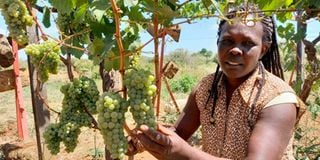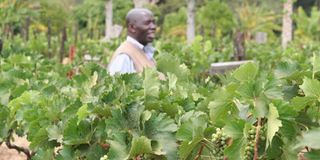Climate change has dried grape vineyards in Meru

Christine Itabari, the manager at Liliaba grape farm in Meru County, at the farm.
Low hanging succulent red and white grapes at the Liliaba grape farm in Meru County stands out from the dangling twigs of miraa dotting most farms.
A few kilometres from the Kangeta market, we find workers busy digging trenches.
Next to them are stretching rows of vineyards supported with metal rods and timber across the farm to prevent them from falling off.
"We are trying to maximise the area under grapes so that we can increase our production as the demand is very high," says Christine Itabari, the farm manager.
The farm was started 45 years ago with an aim of diversifying crops grown in the area by an Italian Catholic priest.
Over the years, the farm has been a spectacle attracting both local and non-locals who visit to learn and start grape farming.
Good payment
With an advantage of being a non-strenous crop that offers good payment per kilogramme harvested, the grape farm drew dozens of farmers who abandoned miraa farming for the venture.
But that is a thing of the past as climate change has dealt them a blow having lost four crop seasons in 2016 and last year.
The Laliaba grape farm had lured over 80 farmers to relegate miraa farming which is the main economic mainstay as they paid Sh100 per kilogramme.

Fr Andrew Mbiko inspects some of the grapes at Liliaba farm.
They were supplied with the vines after uprooting miraa and while they matured for picking, they would deliver the fruits to Mukululu Catholic Church for the processing of wine.
"Our last harvest was February last year as the effects of climate change took a toll on the grape," says Ms Itabari.
She adds that the weather keeps changing abruptly from dry and normal temperatures to heavy rains and cold that causes the plants to abort.
The fortunes of the exciting venture started to wane in 2016 when the dry weather suitable for the thriving of grapes ceased and was replaced by more wet days than usual.
Growing grapes
"From my observation, we do not have farmers growing grapes anymore... because when they lost a crop consecutively they disregarded grape farming," says Regina Kiunga, adding that a majority of them decided to uproot their crops.
Ms Kiunga is in charge of the Mukululu winery where the grapes are crushed to make wine.
Once farmers deliver the grapes at the winery located within the church, it is then processed into four different types of wine that is, red wine, white wine, mass wine and Mukululu sherry that has a longer processing procedure compared to the other wines.
According to Ms Kiunga, it takes about two to three years before it is mature and ready for sale.
During the peak season, they produce over 1,000 bottles of wine that is sold at Sh1, 000 each.
They produce wine under the product label Barbra Meru.
"Last year, we did not make a single bottle of wine because there were no grapes from our farms," she notes.
The region receives minimal precipitation compared to other parts of the country making it conducive for the cultivation of grapes.
Grapes perform better in hot to warm temperatures and during fruiting, the weather should be dry and sunny.
According to Carol Mutua, a horticultural expert based at Egerton University, grapes do well in areas with warm to hot temperatures and the soil should be deep and well drained.





